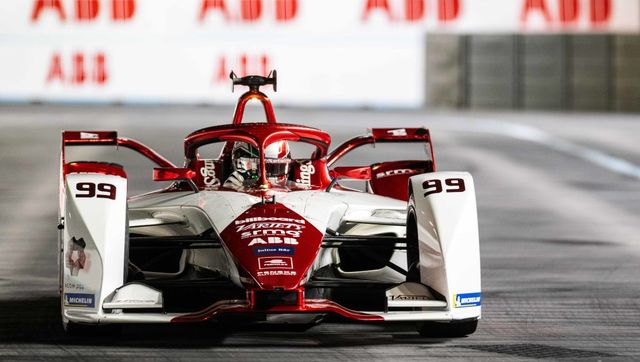This week in the Sustainable Motorsport Roundup we say goodbye to Formula E’s Gen2 car, I talk about Silverstone’s green energy plans, details on the World eX Summit, a fan car revolution that could change F1, alternatives to carbon fibre in motorsport, a hydrogen-powered rally car and more.
Sustainable Motorsport News
- When I read the article in Blackbook Motorsport on how MotoGP is to use Silverstone’s F1 layout from 2023, the thing that caught my eye from a sustainability standpoint was this quote: “MotoGP will also benefit from Silverstone’s on-site generators, which now run on hydrotreated vegetable oil (HVO), resulting in a 90 per cent reduction in CO2 emissions and, from 2023, all the electricity consumed on site will be generated from renewable energy sources.”
- Sebastian Vettel has revealed, not surprisingly, that climate crisis fears influenced his F1 retirement. “Obviously, travelling the world, racing cars and burning resources, literally, are things that I cannot look away from,” he said. “Once I think you see these things and you are aware, I don’t think you can really unsee it. When it comes to the climate crisis, there is no way that F1 or any sport or business can avoid it, because it impacts all of us. Maybe it’ll be pushed back or be more quiet, but it’s only a matter of time – that we don’t have.”
- On Saturday, August 13th (today), the World eX Summit at Bilster Berg will focus on electric racing, esports racing, clean energy and digitalisation. Motorsport.com has the schedule and you can get more information on the conference here.
- Eliud Kipchoge was a special guest at the Race Against Climate Change Live Event in London, hosted by Envision Racing, in partnership with COP 26 and TIME. He told the audience about the impact of climate change on athletes and the work of his foundation, the Eliud Kipchoge Foundation, which is committed to children’s education and reforestation in parts of Kenya. Eliud, who was interviewed by David Garrido, Sky Sports presenter and climate champion, as part of Envision’s discussion about the power of sport and sports fans to create positive environmental change. The event in London took place as Envision’s Sustainable Chain initiative moved close to receiving 100,000 pledges from the public, who pledge to make a simple lifestyle change that will help the environment.
- When I was flipping through Edition (13) of MB Partners‘ Partnership magazine, I noticed an interesting ad from one of their partners. Western Union Business Solutions is offering “the opportunity to accelerate the transition to a low carbon economy while taking advantage of our unparalleled expertise in currency risk management.” It works through various carbon offset programs with the following example:
- When you sign up, you select a preferred type of carbon offset project, covering activities ranging from Renewable Energy through to Biogas and Cookstoves. Each of these has a different US Dollar cost per tonne of carbon offset, but as an example, using the Green Hedging product, transacting tonnes of carbon – enough to offset around 117 return flights for a race weekend in Abu Dhabi to London in economy. Hedging a total of $10,000,000 could offset to carbon footprint of 500 loaded shipping containers with F1 merchandising travelling from China to the UK.
Sustainable Motorsport Tech

- In The returning fan car revolution that could suit F1, Autosport Plus looks at whether the recently demoed McMurtry Speirling at the Goodwood Festival of Speed could point the way towards an even more sustainable future in F1. What they have produced is the smallest, most aerodynamically efficient single-seat car they can to fulfil the basic brief. Crucially, the core focus on removing mass from the car as a whole means that smaller and lighter batteries can be used that, in turn, bring even further benefits.
- Green Racing News looks in detail at Extreme E’s ODYSSEY 21. Going from extreme to extreme is a characteristic of the car in the 100% electric off-road category. For a few weeks it raced under the intense sun of Saudi Arabia and Senegal, before moving on to the frigid climate of the Arctic. However, the ODYSSEY 21 passed the reliability test after a debut season that pushed it to the limit.
- Mygale Cars has been one of the biggest feeder series single-seater manufacturers for more than 30 years and current chassis supplier of the French F4 championship. F1 Feeder Series spoke to founder and CEO of Mygale, Bertrand Decoster, about the exciting upcoming projects for his company, the loss of British F4, and competition with Tatuus. He also discussed their sustainability initiatives. To stand out from its rivals Mygale is now set to become a pioneer in alternative energies. As a feeder series French F4 is one of the rare FIA-sanctioned series to still be 100% thermic. “After being the first to introduce biofuel in feeder series one of our main projects is to bring hybridisation in feeder series, because we think this is the way motorsport should go. There is a major technological evolution around the powertrains of our cars, with biofuel, hybridisation, maybe electrification… hydrogen seems further down the road. But we will have to find a way to handle this transition.”
- The Formula E website looks at how Michelin innovated in the series as they are set to be replaced next year by Hankook. “It started right from the beginning of the championship,” said Jerome Mondain, Michelin Motorsport’s Formula E Manager. “We proposed to the FIA and Formula E to use only a single tyre for any condition: very cold, very hot, dry or wet. The idea was to produce as few tyres as possible with fewer raw materials. We had to mix the mindset of the motorsport spirit and the road purpose mindset.”
- Autosport Plus asks the question: Could F1 move to a future beyond carbonfibre? A much larger proportion of the total footprint lies in transport of both people and equipment around the globe, and this too is high on the agenda – with F1 engaging with the aircraft industry and academia on sustainable aviation fuels (SAF). Many people point out, however, that the cars themselves are built using a large amount of carbonfibre, and ask what effect that has on Formula 1’s carbon neutral ambitions and whether alternatives are being looked at.
- Four-time World Rally Championship title-winner Juha Kankkunen will drive a hydrogen-powered Toyota GR Yaris in stages at next week’s WRC Ypres Rally. This will be the public debut of the newly-developed GR Yaris H2 car, an experimental concept that uses hydrogen to fuel a combustion engine based on the same turbo-charged block found in the regular production car.
- While this has not been applied to motorsport, yet, nanoelectrofuel is a fascinating new rechargeable technology used to store electricity. “Influit’s chief operating officer and head of research and development, Elena Timofeeva explained that the unique high energy density liquid format of NEF flow batteries allows the same fluids to be used in different devices, which means that this, charged at the charging station from renewable energy sources or from a grid, can be used to quickly refuel vehicles, or for stationary storage and other large portable applications.”
Series News
- At a press conference, Formula E Co-founder Alberto Longo expressed his satisfaction for all that has been achieved since 2014, the year in which zero-emission cars took to the street circuits and feels confident in predicting that Formula E is here to stay. “Anyone who would have told me about it eight years ago would have thought he was a bit crazy,” he said. “We’re here to stay and this race in Seoul is a validation of the hard work the team has put in over all these years.”
- When asked if the Gen 3 cars will be able to race farther as a reflection of the greater range on offer from EV road cars, CEO Jamie Reigle says no and that the reason is by design. “Range is clearly something the manufactures are thinking about. Over time, you’ll see endurance racing on electric power. But for the time being, we like that our product fits in an hour broadcast window. The media companies like that it is a bit of a tighter experience, the fans like it. “
- The FIA is set to introduce sustainable fuels to F2 in 2024. They have put out a tender to engine suppliers for Formula Two, with the target for powertrains to be compatible with a 55 per cent mix of the fuel for the start of the 2024 season. The brief also calls for the engine to be fit for development for fully sustainable fuel to be introduced later in the project. It will be an initial three-year contract, with the option for it to be extended until 2029.
- In their recent State of the Sport, IMSA has unveiled more of their sustainability strategy. The introduction of the new GTP class presents new sustainability opportunities. Each GTP car will use a single-source hybrid powertrain, which will allow for a reduction of fuel consumption by more than 10 percent. For each car’s internal combustion engine, IMSA’s Official Fuel Supplier, VP Racing Fuels, will supply renewable VP R80 fuel. Michelin, the Official Tire Supplier of IMSA, has developed a unique new tire for GTP, which will have the ability to double stint. This could lead to a reduction in tire usage of up to 25 percent. Current WeatherTech Championship Michelin race tires have nearly 30 percent sustainable raw materials. Michelin also displayed a new racing tire that contains 53 percent sustainable raw materials. IMSA and Michelin are working together to explore bringing this tire into IMSA competition.





